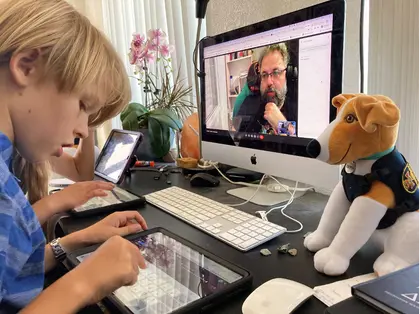Originally from Russia, Michael Waxman is a professor at the University of Wisconsin-Superior. He has never been in Ukraine or known anyone there. Half a year ago, in mid-March, Dr. Waxman posted ads on a few Ukrainian American Facebook sites offering free math, physics, or chemistry tutoring to any kid from Ukraine.
The response was overwhelming, and he immediately started tutoring a few pupils. One boy, a 10th-grader at the time, originally from Kyiv, was hiding with his parents in a small village near the town of Nizhyn. There was street fighting going on in that town during their physics class. After a couple of weeks of their lessons, his mother, a professional psychologist, messaged professor Waxman. She said that after the war started, her son’s psychological condition became precarious. He couldn’t sleep, he was shaking with every loud sound.
JOIN US ON TELEGRAM
Follow our coverage of the war on the @Kyivpost_official.
“We, his parents, tried to talk with him, but nothing helped,” she said. “But since you started teaching him, I saw him suddenly becoming his old, pre-war self, spending all his time searching YouTube for physics videos.”
Waxman was deeply affected by this message. The thing is, he is convinced he is not an outstanding teacher. He realized that if, by teaching a regular class to this child, he could accomplish what a professional psychologist couldn’t, then thousands of others could similarly help these kids, who are so in need of help. It was then that he approached Dr. Vitaly Vanchurin, a Physics Professor at the National Institutes of Health, who became another co-founder of the platform.
Waxman and Vanchurin’s sons have both contributed to the creation of a website for their platform. Waxman’s son Sasha, a beginning industrial designer, has made the initial design of the webpage and created the logo. Vitaly’s son, Kosmos, almost singlehandedly wrote computer codes for the site. Vanchurin’s wife suggested the name Tutoring Without Borders.
Initially, Michael and Vitaly matched pupils and tutors manually, then semi-automatic matching was introduced, and in anticipation of the new 2022-23 school year, to increase site capacity, the platform was upgraded to an almost fully automatic matching.
It took them about a month to get the number of pupils up to a hundred. As of today, however, a total of 3,000 pupils applied to the platform for tutoring, and about 1,000 tutors are willing to help. “Tutoring without borders” now has tutors from all continents and from many walks of life. Among them are faculty, staff, and students from some of the world’s most renowned universities, such as Princeton, Yale, Berkeley, MIT, Cambridge, Oxford, and many others.
Mentors from Ukraine are also present widely, including schools and lyceums, as well as about a dozen Ukrainian Universities, such as Odesa National Medical University, Kamyanets-Podil’skii National University, and Petro Mohyla National University. A singer from the Odesa National Theater has even offered vocal training to future singers.
There are mainly three languages used on the site for teaching: Ukrainian, English, and Russian. When filling out the site questionnaire, pupils and parents are asked to mark the languages, including Ukrainian, English, and/or Russian, in which they are comfortable learning, and their wishes are respected.
At present, many of the volunteer tutors are emigrants who left the USSR or Russia decades ago. Their home languages often are English and Russian, as well as the language of the host country where they have settled. These are the people who can teach Ukrainian youth math, physics, computer science, and other subjects.
Having taught as an American professor for nearly 30 years, Waxman was naturally inclined to teach the courses in English. But when he started to do that with a group of Ukrainian kids, they fell silent. Clearly, they couldn’t gain a complete comprehension of the subject material.
As a result, Waxman switched to a “hybrid” teaching model. He would first give a brief overview of a concept in English and then elaborate in a combination of English and Russian, explaining unfamiliar special terms and asking them to write them down and memorize them.
The relative success of the platform and the growth in the number of volunteer tutors are explicit confirmations of the considerable support Ukraine enjoys worldwide. While the program is not intended to supplant school entirely, it might serve as a good aid, helping to provide children with emotional and intellectual support. Waxman urges any readers who would like to volunteer to sign up on the site: TutoringWithoutBorders.org.
You can also highlight the text and press Ctrl + Enter



